Okay, folks, the audiobook of my short story “Nightfall” has just dropped. Have a listen and see what you think.
(Check out my epic fantasy vampire novel “The Vorbing.” All donations gratefully accepted here.)
Okay, folks, the audiobook of my short story “Nightfall” has just dropped. Have a listen and see what you think.
(Check out my epic fantasy vampire novel “The Vorbing.” All donations gratefully accepted here.)
On June 3rd, 1986, “A Kind Of Magic”, the twelfth studio album from Queen was released. The European Magic Tour supporting the album began four days later at the Rasunda Stadium in Stockholm, Sweden.

It was the first Queen album I’d purchased as a Queen fan, the others being purchased after Live Aid and after this album (by early ’87, I had all Queen’s albums on vinyl and still do.)

With Queen contributing many songs from this album to epic fantasy film Highlander, there was a sort of return to thematic elements of Queen’s early albums minus the quirky, Tolkienesque lyrics about ogres, titans and fairy fellers. This was Queen doing a concept album 80s-style with syths and Highlander’s immortality theme playing into the tragic reality about to engulf Freddie and the band.
Highlander star Christopher Lambert explains how Queen’s involvement grew:
“Highlander coming out was a very exciting time for me. What was also very interesting is that Queen were meant to do only one track – it was the opening credits, ‘Princes Of The Universe’, that was the deal. So they sat down for a private screening for them in a movie theatre and Freddie Mercury when he came out, he said all excited: “I’m doing the whole fucking album! This movie is too fucking great!”. They went and wrote the songs in four weeks and went into the studio and it was one of the biggest selling albums of their career. So you know it’s strange, it’s like nobody ever thought that Highlander was gonna be, thirty years later, still a cult movie, music included. About Freddie… there are many good singers, but to be really great it’s not enough just to sing correctly. You have to do it with the heart and he is the best at it.”
Although it was hard to imagine during Queen’s post-Live Aid second wind, “A Kind of Magic” would be the end of an era for them in many ways. It would be the final album before Freddie’s HIV diagnosis in April 1987 (“Innuendo” would be recorded under time constraints and Freddie’s increasing availability issues due to illness). The Magic Tour would be Freddie’s last with the band.

It was also the last time they worked with German producer Reinhold Mack. Mack first worked with Queen on “The Game” album in 1979 at Musicland Studios in Munich. He had produced some of Queen’s biggest hits including “Crazy Little Thing Called Love”, “Another One Bites The Dust”, “Under Pressure”, “Radio Ga Ga”, “I Want To Break Free” and “One Vision.” Brian May said that Mack had been “quite a find” for the band. He was responsible for a different, stripped-back Queen sound, the antithesis of the elaborate, complex sound of previous Queen producer Roy Thomas Baker. With Baker, Queen played every track in the studio until the take was perfect. Mack said they didn’t have to do that and that he could drop in snippets of different takes. This surprised the band and saved them a lot of time. Mack even persuaded Brian to drop his Red Special and play a Fender Stratocaster belonging to Roger on “Crazy Little Thing Called Love.”

“A Kind of Magic” would also be the last time Queen would do several songs for a movie (here’s hoping the James Bond producers giver Queen + Adam Lambert a shot at the next theme tune).

“A Kind of Magic” is a very listenable album. I can listen to it all the way through unlike some of the late seventies albums which were a smattering of big hits and filler. As with Queen’s concerts on The Magic Tour, the album kicks off with the extended version of “One Vision” which teases out the intro superbly until Freddie’s ethereal vocal cry echoes across the synths just before Brian’s euphoric riff kicks in. “A Kind of Magic” the single follows.

A John Deacon song “One Year of Love is next and it’s the kind of classy, smoky ballad that Sade did so well at the time (saxophone courtesy of the guy who played on “Careless Whisper.”) “Pain Is So Close To Pleasure” is a rare sojourn into Motown stylings for Freddie Mercury (“Cool Cat” on “Hot Space” and B-side “Soul Brother” would probably be the closest tracks to this).

“Friends Will Be Friends” ends side one. Even though it’s a self-conscious attempt to repeat “We Are The Champions” and didn’t make the UK top ten, I still like it as a song.

Brian’s “Who Wants To Live Forever” starts side two and, from here on in, it’s all songs from the Highlander soundtrack. Seal and Ronan Keating said this song made them cry the first time they heard it and it is a very beautiful song with lush orchestral accompaniment. It worked well live on The Magic Tour too, although it was still “a new song” as Freddie said and hadn’t found its place among their other hits with the audience yet.

Brian Blessed’s Vulcan says “who wants to live forever?” in the battle scene near the end of “Flash Gordon,” Queen’s last big fantasy soundtrack outing. It’s possible Brian unconsciously remembered that line from the previous film but it’s a perfect iteration of Highlander’s themes.

Brian’s rip-snorting “Gimme The Prize” erupts with a cascading Brian May solo, it reaches a crescendo and a sound clip from the film Highlander kicks in (a news reporter comments on one of the many decapitated bodies in the film: “A head, which at this time, has no name.” Clancy Brown’s Kurgen responds with “I KNOW HIS NAME!”). “Here I am!” Freddie declares, “I’m the master of your destiny” (one reviewer at the time compared him to Alice Cooper on this).
Roger’s unsurprisingly drum-heavy “Don’t Lose Your Head” pounds in. It began life as the B-side to the single “A Kind of Magic” under the working title “A Dozen Red Roses For My Darling.” Some thought this was filler (black singer Joan Armatrading pops up to say “Don’t Lose Your Head” over and over for no apparent reason, maybe an attempt by the band to counter negative publicity over their Sun City shows in Apartheid-era South Africa around that time.) It does get a little repetitive but I don’t hate it.

Then we come to the final track on the album – “Princes of the Universe.” It’s Freddie’s only solo writing credit on the album (almost hard to believe considering he wrote most of Queen’s early albums single-handedly). The title is outrageously camp but the song builds up an incredible head of steam. With Princes, “One Vision” and “Gimme The Prize”, “A Kind of Magic” is probably the closest version to a heavy metal version of Queen we ever got. The single of “Princes of the Universe” was released in America and the video featured Highlander star Christopher Lambert crossing swords and sawn-off microphone stand with Freddie.

It would be three years before the next Queen album was released, the longest gap there had ever been between albums up to that point. There followed a frenzied period of activity to get new Queen material out before Freddie’s inevitable demise. So “A Kind of Magic” is a demarcation point between what went before and the beginning of the end of Queen Mach 1 (two more would follow with Paul Rodgers and now with Adam Lambert.)
© Stewart Stafford, 2018. All rights reserved.
If you’re a generous person who believes this writer should be paid for his hard work, you may donate here.
To read more of this author’s work, check out his short story Nightfall and novel The Vorbing.
“You can go onto that stage every night, and it’s always the equivalent of going onto the topmost diving board, and you don’t know if there’s any water in the pool” – Glenda Jackson

Stage fright occurs when a knowledge of the work being performed is replaced with a self-conscious awareness of the staring crowd and their expectations. Once it supersedes a performer’s confidence, it is difficult if not impossible for them to perform live again. Then the crippling flight response we’re all aware of comes into play.
Many celebrities suffer from it. After forgetting the lyrics to a song during a 1967 performance in Central Park, Barbara Streisand didn’t perform to a paying crowd for 27 years.
Stevie Nicks of Fleetwood Mac said this:

Abba’s Agnetha Faltskog also had a tough time with the dreaded performance anxiety.

Even Adele, the biggest star in the world, has had her problems with it.
“I’m scared of audiences,” Adele revealed to Rolling Stone magazine. “One show in Amsterdam I was so nervous, I escaped out the fire exit. I’ve thrown up a couple of times. Once in Brussels, I projectile vomited on someone. I just gotta bear it. But I don’t like touring. I have anxiety attacks a lot.”
So what causes stage fright?

The infographic above begins with “inadequate preparation”, so it’s blaming the performer from the off. That’s unfair, even the most meticulously-prepared performer can forget lines and seize up in the glare of the spotlight. The mind goes blank and recall disappears through no fault of their own.
What the list really misses out on is the prime cause, I believe: a lapse in concentration. That’s all it takes, it may just be for a split-second. That’s when the displacement of focus takes place from the internal memorised words to the external presence and demands of the audience. Essentially, the performer has become a mountaineer who is suddenly aware of how high up they are and, crucially, how far they are capable of falling at that moment.
So, while the fear begins in a rational fear of failure and embarrassing yourself in public, the fear itself can become the irrational focus which can lead to panic attacks, sleepless nights and the problem becomes a clinical condition.
Perhaps we should leave the final word to William Shakespeare, himself an actor:
 © Stewart Stafford, 2018. All rights reserved.
© Stewart Stafford, 2018. All rights reserved.
If you’re a generous person who believes this writer should be paid for his hard work, you may donate here.
To read more of this author’s work, check out his short story Nightfall and novel The Vorbing.
I’ve come up with some parody lyrics for Queen’s classic song (and soon to be movie of the same name) “Bohemian Rhapsody.” See what you think.
Bohemian Bap-seedy by Stewart Stafford
Is this just food hype?
Is this a granary?
Come on this snack ride,
No escape from the culinary
Open your eyes,
Look at what’s baked with me,
I should avoid carbs, this is what’s wrong with me,
My weight is easy come, easy go,
Blood sugar high, blood sugar low,
Non-food sales at Waitrose, don’t really matter to me, to me.
Mama, bought a sliced pan,
Got the knife just like she said,
Put the butter on the bread.
Mama, you had one cream bun,
But now I’ve gone and scoffed it all away.
Mama, ooh,
Didn’t mean to be so sly,
I’ll get you another one by this time tomorrow,
And if not, and if not, well I guess it doesn’t matter.
Too late, my hunger has come,
Was going to order food online,
Stomach’s rumbling all the time.
Goodbye, everybody, I’ve got some dough,
Gotta leave you all behind and bake some bread.
Mama, ooh (anywhere your wind blows),
I don’t want diabetes,
I sometimes wish I had a gastric band and all.
I see a little cornetto/choc-au-pain,
Swiss rolls, Swiss rolls, will you get me Focaccia?
Vienna rolls with piping,
Very, very frightening me.
(Petit Gateau) Petit Gateau,
(Petit Gateau) Petit Gateau,
Petit Gateau and Fig rolls
Bon Appe-t-i-i-t.
I’m just a foodie, nobody loves me.
He’s just a foodie from a foodie family,
Spare him his life from this pomposity.
Tell me yes, tell me no, who made the dough?
The miller! No, he did not make the dough. (Make the dough!)
The miller! He crushed the wheat like so. (Crushed it so!)
Vanilla! We love that flavoured dough. (Flavoured dough!)
Love that flavoured dough. (Flavoured dough!)
Never eat that dough (Never, never, never, never eat that dough!)
Paninis?
No, no, no, no, no, no, no
Oh, Ciabatta, Ciabatta (Ciabatta’s running low.)
The baker man has some goodies set aside for me, for free, for free.
So you think you can bribe me with slices of Rye?
So you think I’ll forsake bread and eat up some pie?
Oh, baby, this is never a maybe,
Just go and get out, just go and get right outta here.
(Ooooh, ooh yeah, ooh yeah)
The oven needs some batter,
That’s all I can see,
The oven needs some batter,
The oven needs some batter for me.
Anywhere your wind goes.
© Stewart Stafford, 2018. All rights reserved.
If you’re a generous person who believes this writer should be paid for his hard work, you may donate here.
To read more of this author’s work, check out his short story Nightfall and novel The Vorbing.
The featured image above shows a quote from Picasso being “appropriated” or stolen by Banksy in an ironic demonstration of the efficacy of the quote.
 Israel won the Eurovision Song Contest last weekend and there were howls of derision. The spectre of “cultural appropriation” raised its ugly head again. Israeli singer Netta Barzilai had the temerity to wear a Japanese kimono on stage during her performance of the song “Toy” and that was enough. The internet went into meltdown about it referring to it as “yellowface.” (Some would instead baulk at the idea of culture being used in association with the Eurovision but let’s park that one there for now.)
Israel won the Eurovision Song Contest last weekend and there were howls of derision. The spectre of “cultural appropriation” raised its ugly head again. Israeli singer Netta Barzilai had the temerity to wear a Japanese kimono on stage during her performance of the song “Toy” and that was enough. The internet went into meltdown about it referring to it as “yellowface.” (Some would instead baulk at the idea of culture being used in association with the Eurovision but let’s park that one there for now.)
Why is wearing the national dress of another country automatically seen as negative? It is possible that the person involved is honouring the culture and traditions of that country and is not mocking or “stealing” them.
We even see cultural appropriation in the casting of movies today. It is now being demanded that only ethnically-accurate actors are cast in roles.

Scotsman Sean Connery won his only Oscar for playing an Irish cop in “The Untouchables” and he was terrific in it. As an Irishman, I’m not offended by his performance in the slightest (even though we all know that non-Irish people attemping Irish accents can be a crime against humanity sometimes.) Connery culturally appropriated again when he played a Russian submarine commander (with a Scottish accent) in “The Hunt for Red October.” Just as well he can’t “appropriate” any longer as he’s been in retirment since 2004.

Screenwriting guru Robert McKee said something similar about Quentin Tarantino. At the time of the release of Tarantino’s “Reservoir Dogs” it was pointed out that he had virtually heisted the plot of Hong Kong film “City on Fire” (sometimes even shot-for-shot scenes) in his crime film. Perhaps that’s true about great artists doing that but copyright infringement, the intentional stealing of other people’s ideas for your own glorification and remuneration, is shabby behaviour. I believe in an honest day’s pay for an honest day’s work and especially when it comes to writers who put so much into their work for usually very little return (don’t even get me started on those leeches who offer copyrighted works for free and take food out of the mouths of writers’ kids.)

“Cultural appropriation” or cultural stealing is something different. There is no copyright on culture. Those ideas have been around for hundreds if not thousands of years and the people who originated them are long gone. There are many examples of artists taking elements of other cultures and fusing them together to form something radically new. That is how culture refreshes and revitalizes itself as it brings new interest in old ideas.

Shakespeare borrowed from all over the place. Julius Caesar and Romeo and Juliet? They’re set in Italy. Hamlet? That’s Danish. Macbeth? That’s Scottish. If Shakespeare had not culturally appropriated and only written about England, we’d have missed out on some of the greatest works in the English language. It goes even further than that…

The BBC described David Bowie’s Ziggy Stardust as “one of the most iconic creations in pop history.” Bowie based the look of Ziggy on the make-up of the Japanese Kabuki theatre.

If Bowie was launching that character in the 21st century, he would be bombarded by negative social media posts about cultural appropriation. As many do, he would probably give in to the pressure and drop the character and we would miss out on all that amazing imagery and music.
George Lucas borrowed liberally when he wrote and directed “Star Wars” (1977). His Jedi knights were echoes of England’s Knights of the Round Table from Arthurian legend.

Darth Vader’s helmet was meant to resemble that of a Japanese Samurai warrior (indeed, “Star Wars” apes Akira Kurosawa’s “The Hidden Fortress” by telling the story from the viewpoint of droids C3PO and R2D2, the lowest characters in the story).

“May The Force Be With You” is very similar to “The Lord Be With You” from Christianity which began in the Holy Land. Again, would we want to miss out on a cultural phenomenon and all that has followed from it because of cultural appropriation?
Marlon Brando once described Hollywood as “a cultural boneyard.” I fear that the whole world has become a cultural boneyard of our own making now. Conformity is king. Try anything different and you’re attacked for it by faceless, anonymous keyboard warriors out there in the dark on social media. I noticed this recently while out walking. Every gang of young girls that I passed were clones of each other. They all had the same hairdos, same clothes. They’re afraid to take chances because of peer pressure not to. That is happening in every aspect of our lives. As I’ve said before, you don’t get great art by playing it safe.
So who are these people who cry cultural appropriation at the drop of a hat? They’re a generation of “right-fighters.” FamilyResource.com defines it thus: “A right-fighter is someone who gets overly emotional or angry when people do not agree with them and their opinions or beliefs. A right-fighter is someone who insists on having the last word in an argument or refuses to back down no matter what.”
TV guru Dr Phil McGraw elaborates further that a right -fighter is “one of those people who spend far too much energy convincing the rest of the world that they’re right. They’re right as parents, they’re right at work, they’re right in their relationships, they’re right about politics — and they are all too ready to fight about just how right they are. These insecure people are too fragile to ask themselves how things are working for them, because they might not like the answer one bit. It might mean making a change or admitting they’ve been (dare I say it?) wrong.” Do we really want an army of right-fighters dictating what is culturally acceptable and what isn’t for the rest of us? I think not.
It’s the “echo chamber” idea, that if you only hear opinions that concur with yours, you never have your opinions challenged or hear new ideas and so don’t grow and change.

I saw a white girl get slapped with the “cultural appropriation” label in a tweet recently for having dreadlocks. This is the height of absurdity and it’s only getting worse.

Would you really want to miss out on the works of Shakespeare, Star Wars, Ziggy Stardust, Harry Potter and countless other great works only to gain the pyrrhic victory of being self-righteous? I know I wouldn’t. In the final analysis, the hysteria over cultural appropriation is a politically-correct strait-jacket that is stunting our growth in ways we can’t even measure fully.
I’ll leave you on a laugh. This humourous tweet sums up the fallacy of cultural appropriation perfectly.

© Stewart Stafford, 2018. All rights reserved.
If you’re a generous person who believes this writer should be paid for his hard work, you may donate here.
To read more of this author’s work, check out his short story Nightfall and novel The Vorbing.
Last night for a laugh, I decided to write some parody lyrics for Queen’s classic song “The Show Must Go On.” This is what I came up with:
THE SNOW MUST GO ON
Frozen spaces, what is this snow all for?
Wintry places, I guess we want a thaw
On and on
Does anybody know what all this snow is for?
Another snowball, another swollen eye
Behind the snowdrift, beneath a polar sky
I’m snow-blind, does anybody know where all the snowploughs are?
The snow must go on
The snow must go on, yeah
Outside my lips are chapping
And there’s old Christmas wrapping
But Santa Claus hasn’t stayed on
Whatever happens, I’ll wear thermal underpants
I’ll keep them guessing, lead them a merry dance
On and on, does anybody know about hypothermia?
I guess I’m yearning, to be warmer now
I’ll soon be turning, the heat up full somehow
Outside the ice is breaking, but inside in the dark there’s no big freeze
The snow must go on, yeah, yeah
The snow must go on
Ooh, my snowman’s head is melting
His features took a pelting
But his smile still stays on

My hands are numb, but I don’t think they have frostbite
Sled injuries of yesterday will go but never die
I could cry, my friends
The snow must go on (go on, go on, go on) yeah yeah
The snow must go on
I’ll face it with a gin
The Spring can never win
On with the snow

Ooh, atop the hill, my snowman’s killed
I have to find the will to carry on
On with the snow
On with the snow
The snow must go on, go on, go on…
{Song dissolves into “Oh I do like to be beside the icefield.”}
Original “The Show Must Go On” lyrics © Queen Music Ltd
“The Snow Must Go On” parody lyrics and photos © Stewart Stafford, 2018.
Meme courtesy of Melina Rose
If you’re a generous person who believes this writer should be paid for his hard work, you may donate here.
To read more of this author’s work, check out his short story Nightfall and novel The Vorbing.
I’ve published a scary short story on Wattpad set in Dublin titled “Nightfall.” You can read it here: https://www.wattpad.com/523641592-nightfall-the-shadows-gather

In September 1990, George Michael released “Listen Without Prejudice Volume 1”, the follow-up to the global monster that was his debut solo album “Faith.” My brother, a devoted George Michael fan for many years by that stage, bought the vinyl LP with its black-and-white cover shot of a crowd of immigrants. Brave move number one, where was that famous face?
I had bought the album “Faith” as a Christmas present for my brother several years previously and I decided to check out the new one. The needle dropped down on the record, the crackling began and I sat back to hear what I assumed was going to be Faith 2.

The first track was his single release of the previous month, the anthemic “Praying for Time.” It was a good if unexpected song, but he didn’t appear in the video for it which hurt its sales. It has this sixty-ish horn section on it that indicates that this first single and first track on the album are going in a very different direction to “Faith.”

In a new documentary both Elton John and Liam Gallagher agree (yes, George Michael’s music reaches and unites such disparate musical figures as those) that “Praying for Time” sounds like John Lennon’s “Imagine.” George admitted listening to Beatles albums at the time like “Revolver” and “Abbey Road.” Lyrically, the song echoes Phil Collins’ “Another Day in Paradise” and its socially-conscious struggle with rich white guilt. George was a very generous man during his lifetime, donating sometimes astronomical fees to charities in private which is true altruism. He clearly felt guilty about the immense wealth he attained and tried to do something to redress the balance. “And the wounded skies above” George sings in a beautiful poetic flourish that Sting would counterpoint in “Fields of Gold” with the line “we’ll forget the sun in his jealous sky.”
On to track two and straight into the superbly catchy “Freedom ’90.” Freedom was a constant theme in George Michael’s work and he’d already had a number one hit titled “Freedom” with Wham! in 1984. Freedom ’90 reevaluates what fame means to a more mature pop icon. It’s a seven-minute epic slab of funk that lays the ethos of the album bare for all to see:”Today the way I play the game is not the same, no way/Think I’m gonna get myself happy.” Once again, George would not the play media game by appearing in the video for this song. It instead featured the new wave of “supermodels” (the Kardashians of their day) – Naomi Campbell, Cindy Crawford, Linda Evangelista, etc. Directed by David Fincher (Se7en, Zodiac, Fight Club, Alien 3), it is difficult to hear this song now without seeing that iconic 1990 video in your head.

In the video for Freedom ’90, George continues the violent deconstruction of his “Faith” image by blowing up his guitar, jukebox and setting fire to the BSA leather jacket he wore in the “Faith” video. It was reminiscent of the way David Bowie created the persona of Ziggy Stardust, it reached a crescendo of popularity and hysteria with fans and then Bowie bravely abandoned the image and created another one. Great artists do that though. They don’t want to become stale by pumping out the same stuff. They force audiences to grow and change with them by trying new things. The Beatles were the masters of that, of course.
“They Won’t Go When I Go”, a live recording of a Stevie Wonder song, is the third song on the album. If you want to hear a singer totally in control of his gift, then this is it. I had never heard the original tune, so I was literally listening without prejudice and I was blown away by it. It has the feel of an old spiritual song from the southern United States with that hymnal weariness seeping out of every groove in the vinyl. George’s voice goes crazily deep into bass territory and then right up to the top of his range and it is startling to hear it. It’s got a kind of Old Testament warning on the dangers of moral decay in the lyrics: “Unclean minds mislead the pure.” George covered many Stevie Wonder songs in his career and always made them his own. Stevie was like his spiritual and musical godfather. George had that quality that Elvis possessed of being a supreme interpreter of other people’s songs. Like The King, I thought every cover version he ever did was superior to the original and that’s a rare gift.
There’s some inevitable filler on the album like “Something to Save” and “Soul Free” but even they’re not bad. “Mother’s Pride” is an anti-war song that has its moments. George heard Don McLean’s achingly elegiac anti-war song “The Grave” as a child and it stuck with him (he recorded it in 2003 as war in Iraq loomed.)
“Mother’s Pride” has the line “his country’s eyes” and it made me wonder if he’d based it on the poster for “Born on the Fourth of July”, also from 1990.

“Heal the Pain” is a gorgeous folky ballad that George claimed was influenced by Paul McCartney. Paul doesn’t feature on the 1990 version of the song but he did record a duet version of it with George in 2005.


George had received criticism from black artists like Gladys Knight and Public Enemy for winning prizes at black awards shows at the expense of black artists. It wasn’t his fault that these organisations deemed him worthy of inclusion and victory but George seemed to make a conscious effort with “Listen Without Prejudice” to veer towards the white influences of his youth. He even quotes The Rolling Stones’ “You Can’t Always Get What You Want” on “Waiting For That Day”, which resulted in a co-writing credit for Mick Jagger and Keith Richards.

“Faith” displayed a wide variety of influences with urban RnB (“I Want Your Sex), Elvis-style 50’s rockabilly with a twist of country (the title track “Faith”) and even some Sinatra-style swing on “Kissing A Fool.” The production was super-slick and it became a monster George had created that he happily put to the sword on the follow-up. “Listen Without Prejudice” has a variety of influences too but the production isn’t geared towards the top 40 and multi-million album sales. George had gone up and up in that hot air balloon before and it terrified him. “Prejudice” is more mature and complex than “Faith.” It is more experimental and biographical. George has self-conscious things to say about fame and what it does to someone. He’s showing us the wizard behind the curtain that some of us might prefer to ignore and just hear the hits.
I didn’t like “Listen Without Prejudice” on first hearing it. A month later, after repeated listening, I thought and still think that it’s George Michael’s best album. It wasn’t the obvious sequel to “Faith” that I and a lot of other people were expecting. It challenged its audience to listen without prejudging what they assumed they were going to get. Now, in 2017, almost a year after George’s untimely and still shocking death, “Listen Without Prejudice” has a second coming in a deluxe remastered box set on October 20th. I will be getting it and reliving those shivery moments that George laid down so expertly for us. “”I believe I can leave songs that will mean something to other generations,” George said prophetically in the 80s . Indeed he did. The man was a true original and, yes, to use that overused word – a genius. We lost too many of those in 2016 – George, Bowie, Prince, etc.
I was lucky enough to see George Michael perform live in concert in Dublin twice on one of his last tours. He had one of the purest voices I’ve ever heard in my life. Like his idol Freddie Mercury, the songs George wrote were extremely high-pitched and difficult to sing live but he was note-perfect in the four hours in which I saw him. “I never heard him sing a bad note,” his pal Elton John said recently. I concur.
I worry for the future of music but it is a relief to know that no one can ever take away my memories of the great sounds of the past. “Listen Without Prejudice” happens to be one of them. Catch up with it now if you missed it the first time, kids. It’s a reminder of a time when albums were king, music meant something and creativity counted. Knock yourselves out.
“He was without doubt one of the greatest songwriters this country ever produced and certainly one of the best vocalists ever” – Elton John
© Stewart Stafford, 2017. All rights reserved.
The writer Richard Matheson was born to Norwegian immigrant parents in New Jersey on February 20th, 1926. He had his first story published when he was eight years old. After graduating from high school, he joined the army, serving in the US infantry with the 87th Division in France and Germany during World War II. His experiences of warfare formed the basis of his 1960 novel “The Beardless Warriors.”
After the war, he studied journalism at the University of Missouri and moved to California. Summer 1950 saw Matheson make his first real mark as a writer when his short story “Born of Man and Woman” was published in the Magazine of Fantasy and Science Fiction and drew attention. It had the kind of frightening science fiction themes that became Matheson’s trademark and was the first of dozens of short stories he would publish over the next two decades.

“I Am Legend” from 1954 was his first published novel and is probably his masterpiece (it was voted the best vampire novel of the 20th century by the Horror Writers Association in 2012) A daring deconstruction of the vampire legend, it flips the whole narrative on its head by making the last man alive the destructive predator that vampires fear and despise as he systematically wipes them out by day following a futuristic plague.
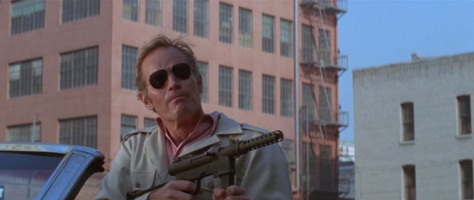
It was adapted for film as “The Last Man on Earth” with Vincent Price in 1964, again as “The Omega Man” in 1971 with Charlton Heston and, more recently, in 2007 with Will Smith.

The book may have been about vampires but its main theme was loneliness and there are few better books about that subject. As the main character Neville is alone most of the time, it’s a difficult story to write but Matheson does a great job of keeping the reader engaged with his solitary hero in his nightmare world. “I Am Legend” also served as the direct inspiration for classic zombie movie “Night of the Living Dead”, giving birth to a whole new genre of film, almost as if the vampire pandemic gave birth to zombies.
He was also a successful television writer, penning episodes of “The Alfred Hitchcock Hour” and “Star Trek” as well as numerous western shows.

His 1956 novel “The Shrinking Man” (filmed in 1957 as “The Incredible Shrinking Man”, which Matheson also wrote the screenplay for) has been ripped off by everything from “Honey, I Shrunk The Kids” to last year’s “Ant Man.” It had its New York premiere 60 years ago this week in February 1957. In 2009, “The Incredible Shrinking Man” was placed in the National Film Registry by the Library of Congress, this accolade is only given to films that are “aesthetically, historically or culturally significant.”
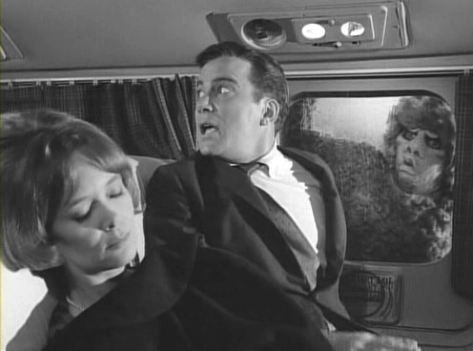
“The Twilight Zone” seemed made for Matheson and another famous story of his, “Nightmare at 20,000 Feet”, was filmed for the show among others. It concerned a nervous flyer (played by William Shatner in the 1963 TV show and John Lithgow in the Twilight Zone movie twenty years later) who is convinced a demon is smashing up the wing of the passenger plane he is on during a vicious thunderstorm. No one believes him, even when he saves the lives of everyone on board by trying to kill the creature and forcing it to flee.


The Simpsons did a parody of this story in one of their Halloween specials where Bart Simpson sees a demon dismantling the wheels of the school bus he’s on. Demonstrating how his stories are so ingrained now in popular culture.
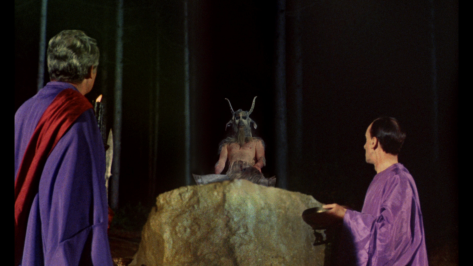
In 1968, he adapted Dennis Wheatley’s novel “The Devil Rides Out” for Britain’s Hammer Horror films. It is one of the best British horror movies ever made and features Christopher Lee in one of his finest roles as a man battling the forces of darkness.
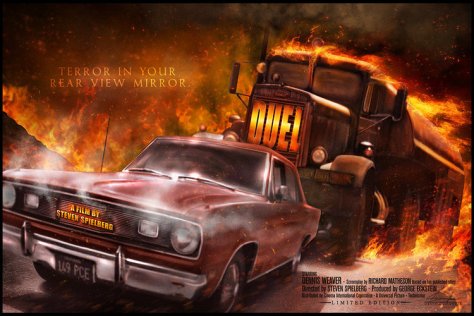
His nerve-shredding TV movie script for “Duel” became Steven Spielberg’s first film in 1971.

Other Matheson novels made into films include “Bid Time Return” which became “Somewhere in Time” starring Christopher Reeve and Jane Seymour (arguably a big influence on “Back To The Future” and “The Terminator”), “What Dreams May Come” with Robin Williams, “Stir of Echoes”, a supernatural horror film starring Kevin Bacon and “Real Steel”, a sci-fi action movie about fighting robots with Hugh Jackman.
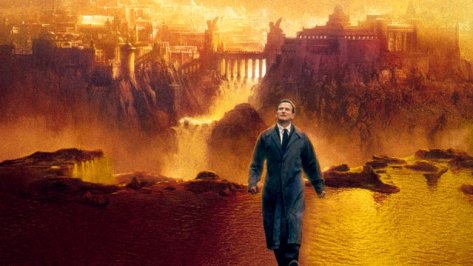
He once said: “I wrote about real people and real circumstances and real neighbourhoods. There was no crypt or castles or H.P. Lovecraft-type environments. They were just about normal people who had something bizarre happening to them in the neighbourhood. I could never write about strange kingdoms. I could never do Harry Potter or anything like that.”
Assessing his career, he said: “I think ‘What Dreams May Come’ is the most important (read effective) book I’ve written. It has caused a number of readers to lose their fear of death, the finest tribute any writer could receive. … Somewhere In Time is my favourite novel.”
His daughter and two sons also became writers.
Richard Matheson died in June 2013. He left behind a significant body of work including dozens of novels, short stories, TV show scripts, TV movies and movies both adapted by him from his own work and adapted by others. Writer Ray Bradbury called him “one of the most important writers of the 20th century.” While Stephen King claimed Matheson was the writer who had influenced him the most. Another writer called Harlan Ellison praised his “supernova lifetime of writing mentioned in the same breath with Poe and Borges.” That is about as good as it gets.
I’ll leave the final word to Mr Matheson: “I hope people are reading my work in the future. I hope I have done more than frightened a couple of generations. I hope I’ve inspired a few people one way or another.” You certainly have, sir, you certainly have.
(“The Vorbing”, my vampire novel inspired by Richard Matheson’s “I Am Legend” is available here)
© Stewart Stafford, 2017. All rights reserved.
If I ever have grandchildren, I’m sure I’ll tell them about the time a newspaper did an article about me. “What’s a newspaper, granddad?” they’ll ask with genuine wonder.
Traditional or “legacy” media (a term which already appears to have consigned television, radio and newspapers to history’s dustbin) forms are struggling to survive in the 21st century. Newspapers, in particular, are seeing sales drop at an alarming rate which, in turn, reduces advertising revenue and only older, die-hard brand loyalists are happy to pay to access content on newspaper websites. It tries to roll with the times to stay afloat by hiring bloggers and sourcing stories from hackers and activists (or “hacktivists”, if you will).
The problem is that the newspaper business model is dying and the purveyors of the new business model are not only deciding what crumbs to feed the press, they’re naming their price too.

There is now a timescale for the demise of newspapers in most countries. It is comparable to how self-publishing challenged the dominance of printed books. Reports of the end of hardback and paperback books have been prematurely announced many times in the last decade. Then sales of ebooks dropped and the electronic takeover didn’t happen. It turns out that people like the feel and smell of a real book. Technology has an annoying habit of losing power or breaking down. Recharging is not always possible but printed books never need that just a light source to read from.
 The internet had a similar affect on music too. The mp3 file appeared to have trumped vinyl records which were in a similar decline. Now vinyl sections of record stores are growing as are sales. There’s life in the old analogue dog yet.
The internet had a similar affect on music too. The mp3 file appeared to have trumped vinyl records which were in a similar decline. Now vinyl sections of record stores are growing as are sales. There’s life in the old analogue dog yet.

Could print media stage a similar comeback? It’s probably wishful thinking as news or rather the information itself is freely available from endless sources. If newspapers charge for content, people can get it somewhere else for free. Citizen journalists don’t have the resources of a major newspaper or that Pulitzer cachet, but they do have that most precious modern commodity in abundance – time. Printed newspapers report yesterday’s news, by which stage a newer story has broken online. Yes, the papers can update their websites but the loyalty is to the information and whoever breaks it first now and not the brand. Even if a newspaper gets a scoop, it can be repackaged by news aggregrator sites and the reader may not even know who originally broke it. In the frenzy to get likes and shares and the kudos of being first with news, the basic courtesy of a hat tip to the originator of a story also appears to be endangered.
So it appears the newspaper is terminal decline. It was a remarkable phenomenon while it lasted but, sadly, it seems to be going or have already gone the way of the Dodo.
© Stewart Stafford, 2017. All rights reserved.